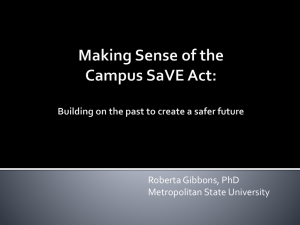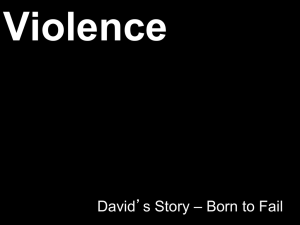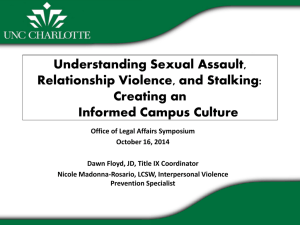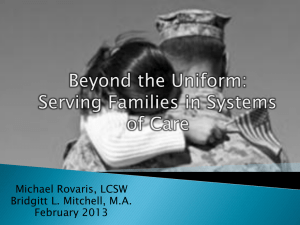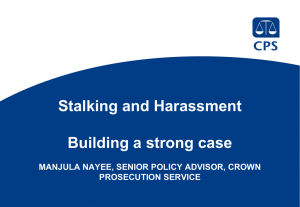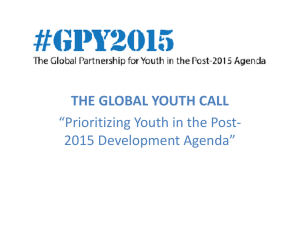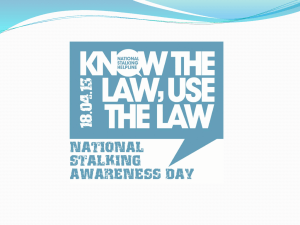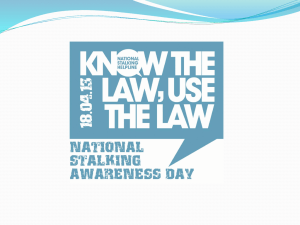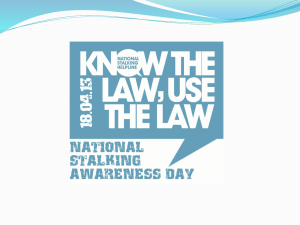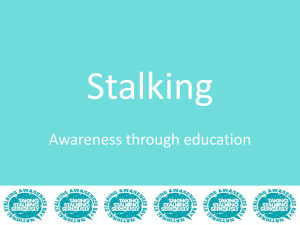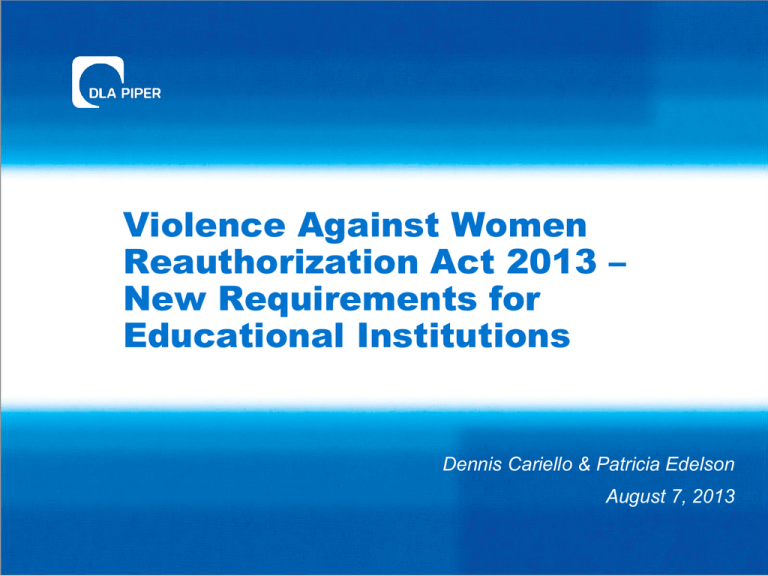
Violence Against Women
Reauthorization Act 2013 –
New Requirements for
Educational Institutions
Dennis Cariello & Patricia Edelson
August 7, 2013
Disclaimers
The contents of these materials and the accompanying discussion do
not constitute legal or regulatory advice.
No party should act or refrain from acting on the basis of any
statements made today without seeking individualized, professional
counsel as appropriate.
These materials and the accompanying discussion are primarily
focused on certain aspects of the Violence Against Women
Reauthorization Act and the Clery Act and are not intended to be
comprehensive of all requirements under those Acts that are applicable
to all educational agencies and institutions.
2
Overview
The Violence Against Women Reauthorization Act,
Public Law 113-4 (“VAWA”) was signed into law March
7, 2013. Section 304 of the VAWA, known as the
Campus Sexual Violence Elimination Act, changes
existing requirements and imposes new obligations on
institutions, particularly with respect to the following:
Additional Clery Act crime reporting obligations
Mandated student disciplinary procedures
Mandated educational and training programs
Overview
The effective date of these requirements is March 7, 2014.
ED will likely issue guidance on the annual campus security
report (perhaps by updating ED's Handbook for Campus
Safety and Security Reporting)
The statutory changes will require changes to the regulations
in 34 CFR Part 668, Subpart D. Although the Department
published a Notice in the Federal Register (78 Fed. Reg.
22467) on April 16, 2013 announcing that the Department may
include VAWA issues in the agenda for the upcoming
negotiated rulemaking committee, the Department did not
include this topic in the upcoming round.
Reporting Requirements
Under existing Clery Act requirements, institutions must
report statistics for certain criminal offenses including
sexual offenses and aggravated assault.
The VAWA imposes additional reporting requirements for
“dating violence,” “domestic violence,” and “stalking.”
Dating Violence is defined as violence committed by a person who
has been in a romantic or intimate relationship with the victim. The
existence of a relationship is determined based on the
relationship’s length, the type of relationship, and the frequency of
interaction. 42 U.S.C. § 13925(a)(10).
Reporting Requirements, cont.
Domestic Violence is defined as felony or misdemeanor crimes of
violence committed by the victim’s current or former spouse or
intimate partner, current or former cohabitant, or by any other
person against a victim who is protected by the jurisdiction’s
domestic violence laws. 42 U.S.C. § 13925(a)(8).
Stalking is defined as a course of conduct directed at a victim that
would cause a reasonable person to fear for his or her safety or
the safety of others, or to suffer substantial emotional distress. 42
U.S.C. § 13925(a)(30).
Reporting Requirements, cont.
Additionally, “national origin” and “gender identity” are
added to the hate crime categories that must be reported
under the Clery Act (joining race, gender, religion, sexual
orientation, ethnicity, or disability). 20 U.S.C. §
1092(f)(1)(F)(ii).
Also, the VAWA mandates that when a school provides
“Timely Warnings” of crimes that are considered a threat
to students and employees, they must withhold the
names of victims as confidential.
Reporting Requirements, cont.
The first Report that must include the new required
information is the report issued by October 1, 2014.
“Until [ ] regulations are issued, we expect institutions to
make a good faith effort to comply with the statutory
requirements in accordance with the statutory effective
date. The Department expects that institutions will
exercise their best efforts to include statistics for the new
crime categories for calendar year 2013 in the Annual
Security Report due in October of 2014. We understand,
however, that institutions may not have complete
statistics for the year when the statistics must be issued
and reported to the Department.”
Some Open Issues on Reporting
The October 2014 Annual Security Report includes
statistics from all of calendar year 2013. Institutions were
not collecting statistics for the first few months of the year
(and we don’t have definitions yet in regulations).
What the exact guidance on defining dating violence,
domestic violence and stalking will include. Does stalking
cover “cyber-stalking?” What geography should we use
for stalking?
Mandated Student Discipline
Requirements
With respect to disciplinary proceedings for domestic
violence, dating violence, sexual or stalking cases,
institutions must adopt procedures that:
Provide prompt, fair and impartial investigation and
resolution, by officials who receive annual training on how to
conduct investigations and proceedings in a way that
promotes accountability and protects the safety of victims
Entitle the accuser and accused the same opportunities to
have others present and to be accompanied at any
proceeding by an advisor of their choice
Mandated Student Discipline
Requirements, Cont.
Identify the standard of evidence used in any disciplinary
proceeding and possible sanctions
Notify the accuser and accused simultaneously, in writing, of
the outcome of the proceeding, procedures for appeal, any
change to the result before it becomes final, and when the
result of the procedure becomes final
Address how the confidentiality of victim information will be
protected
Note, VAWA does not prescribe the evidentiary standard,
however, OCR’s April 4, 2011 Guidance Letter, at page
11, directs a standard of “preponderance of the
evidence.”
Mandated Student Discipline
Requirements, Cont.
In addition to existing Clery Act requirements, institutions
are required to provide information concerning:
a victim’s option to notify and seek assistance from law
enforcement and campus authorities or to decline to do so,
a victim’s rights and the institution’s responsibilities
regarding restraining and protective orders.
Mandated Training and Educational
Programs
Institutions are required to provide education programs to
all incoming students and employees to promote
prevention and awareness of rape, acquaintance rape,
domestic violence, dating violence, sexual assault, and
stalking.
Such programs must include:
A statement that the institution prohibits domestic violence, dating
violence, sexual assault, and stalking
The applicable jurisdiction’s definition of domestic violence, dating
violence, sexual assault, and stalking
The applicable jurisdiction’s definition of consent (in reference to
sexual activity)
Mandated Training and Educational
Programs, Cont.
Such programs must include (cont.)
“Safe and positive” options for bystander intervention to prevent or
intervene when there is a risk to another person of domestic
violence, dating violence, sexual assault, or stalking
Information on how to reduce risk and recognize warning signs of
abusive behavior and how to avoid a potential attack
Institutions must also provide “ongoing prevention and
awareness campaigns for students and faculty” that
includes the material provided to incoming students and
employees
Policy Requirements
Codifies parts of OCR’s April 4, 2011 DCL, such as that
the policy statements of the security report shall include:
Possible sanctions and protective measures following a final
determination regarding rape, acquaintance rape, domestic
violence, dating violence, sexual assault, or stalking;
Procedures victims should follow if a sex, offense, DV, dating violence,
SA, or stalking has occurred, including the following information provided
in writing:
The importance of preserving evidence for proof (for prosecution or in
obtaining a protective order);
To whom the offense should be reported;
Options regarding reporting, including law enforcement and campus
authorities options to:
Notify victim of the option to notify on-campus and local police;
assist the victim if they choose in notifying law enforcement; and
give the victim the right to decline to notify such authorities.
Policy Requirements
Codifies parts of OCR’s April 4, 2011 DCL . . .(cont.):
Rights of victims and institutional responsibilities on orders of protection,
no contact orders, restraining orders, or similar lawful orders issued by
criminal, civil, or tribal courts.
Procedures for institutional disciplinary action in cases of domestic
violence, dating violence, sexual assault, or stalking:
Proceedings will provide a prompt, fair, and impartial investigation and
resolution; and be conducted by officials who receive annual training
on issues related to DV, dating violence, SA, and stalking, and how to
conduct an investigation and hearing process that protects the safety of
victims and promotes accountability.
The accuser and accused are entitled to the same opportunities
to have a support person/advisor of their choice at any
proceeding or related meeting.
Policy Requirements
Codifies parts of OCR’s April 4, 2011 DCL . . .(cont.):
The accuser and accused must be simultaneously informed in
writing of:
the outcome of any institutional disciplinary proceeding that arises
from an allegation of domestic violence, dating violence, sexual
assault, or stalking.
The institution’s procedures for appealing the results of the
proceeding.
Any change to the results that occurs prior to the time that such
results become final.
When such results become final.
Information about how confidentiality of victims will be protected
Written notification of students and employees about services
available for victims both on-campus and in the community.
Policy Requirements
Codifies parts of OCR’s April 4, 2011 DCL . . .(cont.):
Written notification to victims about options for, and available
assistance in, changing academic, living, transportation, and
working situations, if requested by victim and if reasonable
available, regardless of whether victim chooses to report the crime
to campus police or local law enforcement.
A student or employee who reports to an institution of higher education
that s/he has been a victim of domestic violence, dating violence, sexual
assault, or stalking, whether it occurred on or off-campus, shall be
provided with a written explanation of his or her rights and options.
No Retaliation
There shall be no retaliation against anyone who exercises
rights under the Clery Act and Title IX
Other Open Issues
The law requires “ongoing prevention and awareness
campaigns for students and faculty.” What is a “campaign?”
While a “campaign” is more involved than “notice”, it’s not clear
what it requires.
Questions?
Dennis Cariello
Patricia Edelson
212-335-4816
212-776-3737
Dennis.Cariello@dlapiper.com
Patricia.Edelson@dlapiper.com
educounsel@twitter.com
Check out our Education Blog:
www.educationindustryreporter.com
21


